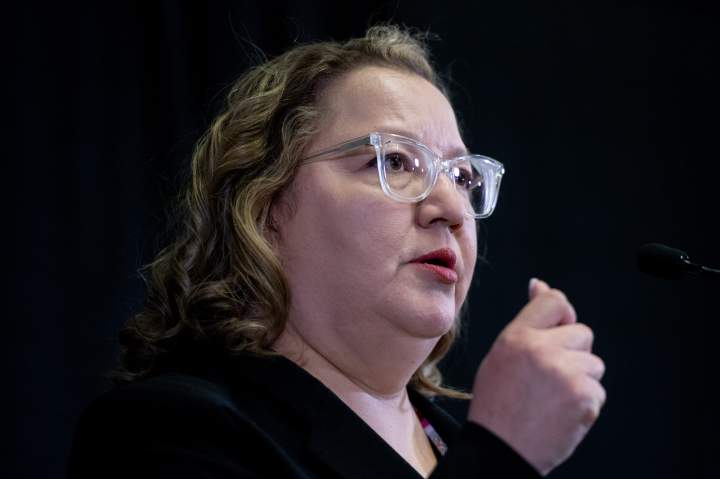By
Andrew Russell ,
Carolyn Jarvis & Michael Wrobel
Global News
Published November 22, 2022
11 min read

Welts and bruises from the whip of a belt. Sexual abuse that leaves lasting emotional scars. Behavioural problems that leave parents feeling helpless.
These are among the heartbreaking reasons kids are placed in Ontario’s child-welfare system.
Experts say intensive therapy is needed for kids to heal from the trauma of abuse, or to live with mental health disorders.
But Jamar Morrison said help didn’t come in the form of therapy – it came in a handful of pills.
Morrison was an energetic teenager with dreams of becoming a dancer. Images and videos from his Facebook account show a smiling 12-year-old popping and locking in his bedroom as hip hop plays in the background.
In 2010, he was placed in the care of Hatts Off, the second-largest operator of group homes for youth in Ontario. After arriving at one of the company’s Hamilton-area homes, Morrison said he was prescribed up to five pills a day, including antidepressants.
“I got medication. That was my help,” he said.
Sitting in a Hamilton apartment for an interview late in the evening, Morrison, now 25, has just finished a 13-hour shift doing manual labour and is still wearing his work clothes.
Morrison is animated, hands imitating the “hundreds” of times he said he was physically restrained on the ground or up against a wall by workers at Hatts Off.
While in the group home, Morrison said workers also restrained kids “chemically” as every kid he met was medicated.
“Every single one,” he said.
Rarely did he see a counsellor or psychologist for comprehensive talk therapy to help him recognize negative thought patterns, Morrison said. The few art therapy sessions on offer were useless and just a way to get free cookies, he said.
After being on a steady regimen of pills, he said he became suicidal.
“I actually did hang myself in the closet, and a staff came in, walked in and found me,” said Morrison.
“She actually took me off of the belt. Just sat there and hugged me. And we both just cried.”
Roughly 20 staff and former youth with the for-profit company told Global News they felt that kids in the home were “overmedicated” and had little access to intensive therapy.
Many said the use of psychotropics – a category that includes antidepressants, anti-anxiety drugs, sedatives, stimulants and antipsychotics – was widespread in the group homes. These types of pharmaceuticals include Ritalin, tranquilisers and anticonvulsants.
Kids often didn’t know why they were even taking the pills, say former workers and youth.
In addition to psychotropic medications, melatonin supplements were also used by the group homes to help children and youth sleep. They were “popped like candy,” current and former staff said.
On movie nights in one residence, kids would beg not to take their pills so they could stay awake long enough to watch a film, said two former workers, one of whom fought what they perceived to be overprescribing.
Workers said the combination of a lack of activities, few outings, and “overmedicating” often had disastrous results.
It caused youth to lash out, according to former workers, which resulted in a cycle of more prescriptions.
“There’s no counselling. There’s no therapy. There’s nothing going on in their lives,” the former worker said. “They don’t really see their families. What else do they have to do but let their frustrations build up and then explode on you?”
The kids had every right to be angry, according to staff.
“I would be angry,” said another former worker. “They had trauma and they missed their families.”
Tisheena Burnette, who arrived at a Hatts Off home when she was 12 and lived there from 2012 to 2014, said the four or five pills a day left her feeling like “a zombie.”
“I was sleeping all the time. I was moody and sad,” she said.
“I was very, very overmedicated.”
The use of psychotropic medication in foster and group-home care is not widely studied. But the latest data from 2021 offers a rare glimpse into how widespread the use of these behaviour-altering drugs is across Ontario’s group homes.
According to a research project called Ontario Looking After Children, roughly 75 per cent of minors in Ontario’s group homes took psychotropic medications in 2021.
Experts, including a developmental paediatrician, say the use of these drugs requires intensive follow-ups and regular monitoring.
Medications shouldn’t take the place of therapy to address mental-health issues caused by trauma, experts said.
“Our best use of medications should make you feel more like yourself and not less like yourself,” said Dr. Melanie Penner, who works at Holland Bloorview Kids Rehabilitation Hospital in Toronto.
Hatts Off declined repeated requests for an interview. In a statement, however, the company denied that it failed to provide kids with proper counselling and said it employs a full-time psychotherapist. It said it couldn’t comment on specific cases or individuals, citing “confidentiality.”
It also said it has contracts with five other psychotherapists who offer a variety of counselling methods, such as cognitive behavioural therapy, art therapy, trauma therapy and addictions counselling, among others.
There are currently “44 children and youth under the age of 18 who are engaged in therapy,” Hatts Off chief operating officer Bronwyn Naylor said in the statement.
The company added that the COVID-19 pandemic restricted or shut down the ability to do most activities.
“Prior to the pandemic, residents were involved in horseback riding, tumbling and skating, as well as visits to the movies, apple picking, bowling, laser tag, swimming,” Naylor said.
Hatts Off wouldn’t comment on the use of medication.
“It would be well beyond the scope of a responsible residential care provider to attempt to question or otherwise interfere with a treatment plan for one of its residents,” Naylor said, adding that the company relies on “qualified, experienced, and reputable health care professionals.”
Hatts Off also said physical restraints are only used as a last resort when the safety of a child or other person is at immediate risk and after “lesser intrusive measures – like de-escalation techniques – have been attempted.”
When youth from some Hatts Off homes do visit a psychiatrist, many say they would visit Dr. Ramakrishna Surapaneni. His office is located in a strip plaza in Waterloo, inside a small pharmacy, a one-and-a-half-hour drive from Toronto.
Former youth and staff said the appointments sometimes lasted only five to 20 minutes and felt transactional, with the doctor coming across as “cold,” and asking few questions about their health.
Some youth and staff described him as a “pill pusher.”
“I remember sitting in his office,” Burnette said. “It seemed like he was just used to going through the same routine.”
Every session ended with an increase in medication – never a decrease, according to former workers and youth.
“Based on that five- (or) 10-minute interaction, the doctor signs the prescriptions and you’re good to go,” said the former worker.
“(Dr. Surapaneni) was the essential piece to Hatts Off’s foundation,” they said. “Without him, you know, you wouldn’t be able to keep all the kids drugged and medicated.”
Burnette had been living with family in another province through a foster-care arrangement when she was suddenly told she was being moved back to Ontario.
A social worker picked her up from Pearson International Airport, and drove her to a Hatts Off residence just outside of Brantford, Ont.
She said she experienced “suicidal ideation” and was depressed from the multiple pills a day.
“I felt like I wasn’t myself,” she recalled.
Grant Charles, an associate professor at the University of British Columbia’s School of Social Work, said staff without experience in caring for kids can often rely on medication to help “get them through the day.”
“Those workers, for the most part, are going to be focusing on control,” Charles said.
“That’s how they deal with the threat of violence against them. Medication is a nice way of dealing with that.”
At one point, Burnette said she was alarmed to learn a doctor working for Hatts Off had prescribed her with the antipsychotic Risperidone, which can be used to treat schizophrenia or bipolar disorder. She hasn’t ever been diagnosed with either, she said.
Months before leaving the care of Hatts Off, Burnette said another physician took her off most of the pills. Today, she only takes Prozac for anxiety and depression.
“Having actual therapy and coping mechanisms to deal with both past and present angers or frustrations or feelings would have been really helpful,” she said.
Emails, calls and even a letter to Dr. Surapaneni seeking responses to our questions went unanswered.
Global News visited Surapaneni’s office in Waterloo, where he told Global News on a short walk from his car to his office that the allegations against him were “nonsense.”
“I’m doing my best work and nothing else,” he said. ”Get the hell out of here.”
Surapaneni has been practising psychiatry for more than 35 years, according to the College of Physicians and Surgeons of Ontario’s website. He doesn’t have any outstanding complaints with the college.
Shortly before publication, Global News received an unsolicited email from Hatts Off containing roughly 40 letters of endorsement from workers – many of them anonymous – written at the request of Hatts Off’s CEO, Gordon Naylor.
The letters provided a different view of life inside Hatts Off group homes, with workers saying there were never any issues with clothing or feeding kids, and that there was access to therapy for both clients and staff.
Some said they never saw any issues with overmedication. Hatts Off would not make some of the current or former employees available for an interview and verification.
“Regular medication reviews are held with their doctors and medications are clearly documented on daily medication tracking sheets,” wrote Ashley Deeley.
Ontario’s laws require that caregivers obtain consent for medical treatments from patients – including minors – “voluntarily” and not through “coercion.”
But Morrison and other youth and staff who spoke with Global News said they would have their outings taken away or would be “grounded” for failing to take their medication.
“You couldn’t do anything. You couldn’t watch TV. You had to go up to your room until you took your medication,” Morrison said.
One former worker said the goal wasn’t to force kids to take their pills, but to “make it very hard for them to refuse.”
A different former staff member, whom Global News isn’t identifying as they currently work with children, said withholding electronics or LEGO was a way to get kids to comply.
“We take away their toys and hide the toys in the office,” said the former worker.
It amounted to cruel punishment for kids dealing with trauma, they said.
Former and current staff also described a widespread use of PRNs, or “pro re nata.” It’s a Latin term used for prescriptions that are to be taken as needed.
At Hatts Off, these included heavy sedatives given after emotional outbursts that were described by former staff as “chemical restraints.”
“(Staff) didn’t really have the experience to be working with the youth that we were supporting,” said another former worker, whom Global News isn’t naming as they still work in child protective services.
Hatts Off said that children and youth are encouraged to follow the direction of their physician or psychiatrist and the company would never ask staff “to coerce or force a resident to take medication or reprimand them for not doing so.”
“Before a PRN is administered, it must be approved by a supervisor or director. This would then be documented in the medication record along with the reason why,” the company said in a statement.
Hatts Off said the conditions for when these types of drugs are administered are “specifically dictated by the prescribing physician.”
Ontario’s Minister of Children, Community and Social Services declined to answer a detailed list of questions about allegations of overuse of medications in Ontario group homes.
After years of traumatic experiences in multiple group homes, Burnette now lives in Peterborough and works two jobs to care for her son. Rubbing her stomach, she said she’s expecting.
She is currently studying to become a social worker at Fleming College.
Jamar Morrison lives in Hamilton and was re-assessed by a psychiatrist after leaving Hatts Off, he said. He no longer takes any medication.
Both said they want to see a dramatic change in Ontario’s child-welfare system and are calling for a larger investigation into for-profit care providers.
“It’s not a life for a kid. It’s not a life for, honestly, any human being,” Morrison said.
– with files from Mikail Malik
If you or someone you know is in crisis and needs help, resources are available. In case of an emergency, please call 911.
The Canadian Association for Suicide Prevention, Depression Hurts and Kids Help Phone 1-800-668-6868 — all offer ways for getting help if you, or someone you know, is suffering from mental health issues.
For a directory of support services in your area, visit the Canadian Association for Suicide Prevention.
If you are a child in the care of a children’s aid society and are experiencing abuse or mistreatment or need help, you can contact the Ontario Ombudsman’s Children and Youth Unit at 1-800-263-2841.
If you would like to share your experience working or living in the child-welfare system, please reach out to us in the form below.


















Comments